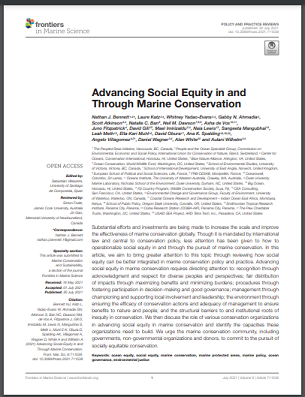
Substantial efforts and investments are being made to increase the scale and improve the effectiveness of marine conservation globally. Though it is mandated by international law and central to conservation policy, less attention has been given to how to operationalize social equity in and through the pursuit of marine conservation. In this article, we aim to bring greater attention to this topic through reviewing how social equity can be better integrated in marine conservation policy and practice. Advancing social equity in marine conservation requires directing attention to: recognition through acknowledgment and respect for diverse peoples and perspectives; fair distribution of impacts through maximizing benefits and minimizing burdens; procedures through fostering participation in decision-making and good governance; management through championing and supporting local involvement and leadership; the environment through ensuring the efficacy of conservation actions and adequacy of management to ensure benefits to nature and people; and the structural barriers to and institutional roots of inequity in conservation. We then discuss the role of various conservation organizations in advancing social equity in marine conservation and identify the capacities these organizations need to build. We urge the marine conservation community, including governments, non-governmental organizations and donors, to commit to the pursuit of socially equitable conservation.














